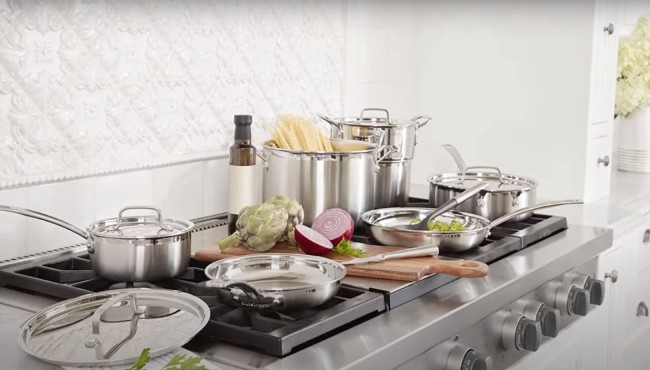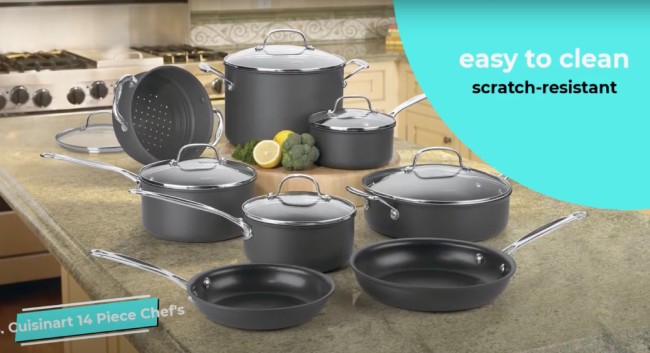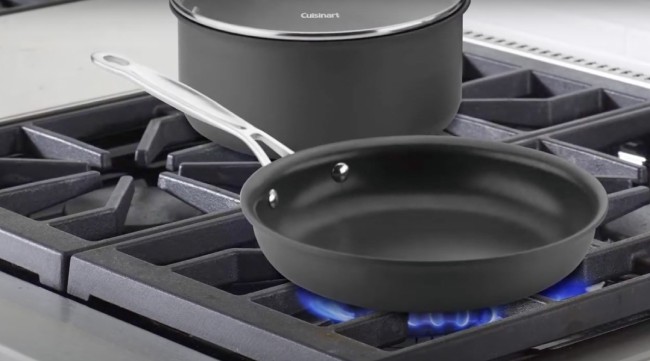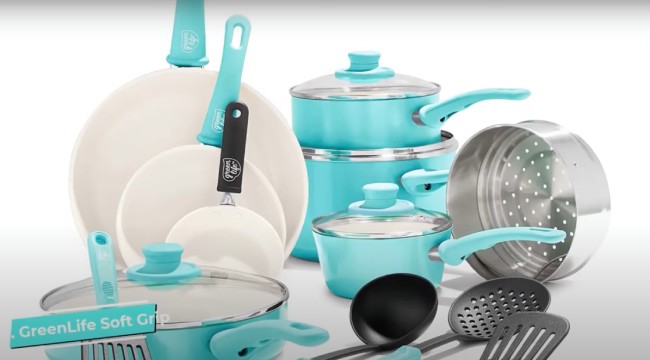Can you use any cookware on a gas stove? Do you want to know what kind of cookware works best on a gas stove? In this blog post, we’ll break down the specifics of cooking on a gas stovetop and help answer any additional burning questions you may have about how to use it most effectively.
We will address whether various types of cookware are suitable for gas ranges and provide tips on maintaining them so they continue working at their maximum potential. So without any further ado, let’s begin exploring the wondrous world of cooking with a gas range!
Understanding Gas Stoves
The Basics of How Gas Stoves Work:
Gas stoves have a unique heating system that differs from traditional electric stovetops. Gas stoves use natural gas or propane to create heat rather than relying on electricity. This cooking appliance utilizes burners, the “cooking surfaces” at the stove’s top.
The burners sit above a series of pipes connected to the fuel source, usually inside or below the stove. When you turn on a gas burner, the heat from the flame causes air to be drawn into the combustion chamber. This air helps to burn off some of the gas, causing it to become hotter and create an even more intense flame.
The hot flame then radiates outward, distributing heat to the surrounding area. This is why gas stoves are so effective in cooking food; the intense and direct heat helps to cook and caramelize foods like vegetables or meats quickly.
It’s important to note that the size of the flame will determine how much heat is distributed from a burner. An enormous love will generate more heat than a smaller flame, so it’s essential to adjust the size of your pet accordingly. By doing this, you can ensure that your food gets cooked evenly and quickly.

Benefits of Using a Gas Stove
Gas stoves offer a variety of benefits when it comes to cooking. For one, they are incredibly efficient in terms of energy use. Since gas is directly converted into heat, you can expect faster heating times and more even temperatures than you would find with an electric stovetop.
Additionally, gas stoves give the user more control over temperature and heat distribution. The user can easily adjust the size of the flame to control how much heat is radiated from a burner, which helps them cook food more evenly and quickly.
Finally, gas stoves are relatively easy to maintain compared to other types of stovetops. The burners can be wiped clean with a damp cloth or sponge; some even come with removable drip pans for easy cleaning.
Can You Use Any Cookware on a Gas Stove?
When choosing the right cookware for your gas stove, there are some things you should keep in mind. While most types of cookware will work with a gas stovetop, there are some restrictions when it comes to material.
For example, you should avoid using cast iron cookware on a gas stove as the intense heat can cause the metal to warp. You should also avoid using aluminum-based cookware as it can scratch and discolor your stovetop.
The best type of cookware on a gas stove is stainless steel. This material is strong enough to withstand the flame’s heat and will not scratch or discolor your stovetop. Additionally, it’s relatively easy to clean and maintain as well.
When in doubt, always check with the manufacturer of your gas stove for specific recommendations on what types of cookware are safe to use. Following these guidelines will help ensure your stovetop stays in the best shape possible for years.
Different Types of Cookware
Non-stick Pans:
Non-stick pans are the perfect choice for gas stoves. They are lightweight, easy to clean, and require less fat or oil when cooking. However, non-stick pans can be easily scratched and should not be used with metal utensils or over high heat.
Features:
- Lightweight
- Easy to clean
- Require less fat or oil when cooking
Benefits:
- Food easily slides off the surface
- Reduced risk of burning food
Drawbacks of using non-stick pans on a gas stove:
- It can be easily scratched
- Not suitable for use with metal utensils
- Do not use over high heat
Cast Iron:
Cast iron is another excellent choice for use on a gas stove. Cast iron cookware has superior heat retention and durability, making it ideal for cooking foods that require long cooking, like stews or sauces. It also creates an even and consistent heat distribution when searing meats or vegetables.
Features:
- Extremely durable
- Retains heat well
Benefits:
- It can be used to cook almost anything
- Easy to clean up when seasoned properly
Drawbacks of using cast iron on a gas stove:
- Heavy and bulky
- Seasoning required for maintenance
- Must be heated slowly on low to medium heat
Stainless Steel:
Stainless steel is an ideal choice for gas stoves. It’s highly durable, easy to clean, and can handle high temperatures. Stainless steel cookware also offers rapid heating time and superior heat retention, making it perfect for stir-frying vegetables or sautéing meats.
Features:
- Compatible with any stove
- Heat resistant up to high temperatures
Benefits:
- Easy to clean and maintain
- Does not react with acidic foods
Drawbacks of using stainless steel on a gas stove:
- It can become easily scratched or warped if overheated or used improperly
- It can be more expensive than other types of cookware
Copper:
Copper cookware is a great choice for gas stoves. Copper is an excellent heat conductor, making it ideal for searing or sautéing food. It’s also lightweight and easy to clean. However, copper requires regular polishing to maintain its luster and can be expensive compared to other types of cookware.
Features:
- Excellent heat conductor
- Shiny and attractive look
Benefits:
- Cooks food quickly and evenly
- Easy to clean with the proper care
Drawbacks of using copper on a gas stove:
- It can be expensive compared to other types of cookware
- Must be cleaned with special cleaners and polishes to prevent tarnishing

Choosing the Right Cookware for Your Gas Stove
Heat Conductivity:
When cooking on a gas stove, choosing the right cookware for your needs is essential. Different materials conduct heat differently; some are better suited to gas stoves than others. The three most common materials used for cookware are aluminum, stainless steel, and copper.
Aluminum is the best conductor of heat and is an inexpensive option, making it the most popular choice for cookware in many kitchens. It’s lightweight and distributes heat quickly and evenly, which is ideal for gas stoves. However, aluminum can react with acidic ingredients, so you should opt for another material if you cook sour dishes.
Stainless steel is slightly less efficient at conducting heat than aluminum but is still a good option for a gas stove. It’s highly durable and won’t react with acidic foods. The downside of stainless steel is that it takes longer to heat up than aluminum, so you may need to turn the flame higher when using it.
Copper cookware is the most efficient conductor of heat, although it’s also the most expensive option. It heats up quickly and evenly, making it ideal for gas stoves. Copper is also non-reactive with acidic ingredients but should be kept clean to prevent discoloration or a metallic taste in your food.
When choosing cookware for your gas stove, consider your budget and what type of dishes you plan on cooking. Whichever material you choose, ensure it’s thick enough to distribute the heat evenly and won’t scratch or warp from direct contact with flames.
Cookware Base:
A flat-bottomed pan is essential when cooking on a gas stove. This ensures that the heat is evenly distributed across the entire surface of the pan, regardless of its size or shape. Additionally, having an even base makes maneuvering and stirring food while cooking easier.
Ensuring your cookware has a flat bottom perfectly aligned with the burner is essential. If it isn’t, you may find that some areas of the pan are hotter than others or that heat is not evenly distributed. An uneven base can also cause food to stick and burn more easily.
To ensure your cookware has a flat base, place it over the burner and look for gaps or raised edges. If any are present, try to find another flat and even pan. You should also check the underside of the cookware for any imperfections.
When cooking on a gas stove, having the right cookware is critical. A flat-bottomed pan ensures that heat is evenly distributed across your food without burning or sticking.
Please choose the suitable material for your needs and budget, and ensure it’s perfectly aligned with the burner to ensure even heat distribution. With proper care and maintenance, you can enjoy delicious meals on your gas stove for years.
Size and Shape of Cookware:
The size and shape of your cookware can significantly impact how you cook on a gas stove. Choosing cookware that is the right size for your burner is essential, as items that are too small or too large may not heat evenly or take longer to heat up.
Additionally, it’s essential to consider the shape of your cookware. A comprehensive, shallow pot or pan will heat quickly and evenly, making it ideal for gas stoves. However, more bottomless pots and pans may take longer to heat up, leading to hot spots if not used correctly.
It’s also worth noting that certain shapes are better suited to specific dishes. For example, a wok is perfect for stir-frying and sautéing, while a Dutch oven is ideal for slow-cooked stews or soups.
When selecting cookware for your gas stove, ensure it’s the right size and shape for your needs. The right tools can help ensure maximum heat distribution with minimal risk of burning or sticking. With the right equipment, you can enjoy delicious home-cooked meals with ease.
Caring for Your Cookware on a Gas Stove
Maintenance Tips:
When cooking on a gas stove, the type of cookware you choose can make a big difference in how your food turns out. Some materials are better for high-heat cooking applications than others. It’s essential to understand the qualities of each cookware material so you can ensure that your dishes come out looking and tasting their best.
Here are some tips to help you select and care for the best cookware for your gas stove.
Cast-Iron: Cast iron is an ideal choice on a gas stove, as it can withstand high heat and distribute it evenly. The downside is that cast-iron cookware must be seasoned regularly to keep its non-stick properties. Wipe it down with vegetable oil after each use to strengthen your cookware, and heat it for a few minutes on the gas stove.
Stainless Steel: Stainless steel is another good choice for cooking on a gas stove, as it can withstand high temperatures and is relatively non-reactive. To clean stainless steel cookware, use hot water, mild detergent, or baking soda and scrub with a soft cloth.
Non-stick: Non-stick cookware is designed for low to medium-heat cooking applications, so it’s not the best choice for use on a gas stove. However, if you do choose to use non-stick cookware, be sure to take extra precautions to avoid damaging the coating and releasing toxins into your food.
Always cook on low to medium heat, and never use metal utensils with non-stick cookware, as they can scratch the surface quickly.
Aluminum: Aluminum is another good choice for gas stoves, as it is a lightweight material that heats quickly and evenly. To clean aluminum cookware, wash it in hot soapy water and then rinse and dry it.
By following these tips, you can ensure that your cookware remains in top condition for years. Along with proper care and maintenance, always remember to use the right type of cookware for your gas stove to get the best results out of your cooking.
Safety Considerations:
When using cookware on a gas stove, always pay attention to the type of material and how it is designed to perform. Always use low to medium heat settings for non-stick cookware, and avoid cooking on high heat with aluminum or thin stainless steel cookware, as this can cause warping.
Make sure that handles are always turned inward so they don’t overhang and cause accidents. Lastly, always use thick oven mitts or pot holders while cooking to protect your hands from heat.

FAQs about Can you use any cookware on a gas stove?
What is the best material for cookware on a gas stove?
The best materials for cookware on a gas stove are cast iron, stainless steel, and aluminum. Cast iron is an excellent conductor of heat, has superior heat retention capabilities, and can withstand frequent use at high temperatures. Stainless steel is durable and easy to clean, making it ideal for everyday use. Aluminum is lightweight and conducts heat well, but it should be used cautiously as it is prone to warping.
Can I use non-stick pans on a gas stove?
Non-stick pans can be used on a gas stove but only at medium heat. Non-stick pans are more sensitive to high temperatures and may release fumes that could be toxic when overheated. It is also essential to avoid using metal utensils with non-stick cookware, as this can scratch the pan’s surface and ruin its non-stick properties.
What other cookware can I use on a gas stove?
Other suitable cookware for use on a gas stove includes copper, enameled cast iron, and even some ceramic pieces. Copper cookware is considered the most efficient heat conductor of all materials, though it is more expensive than other metals.
Enameled cast iron retains heat well and is easy to clean, while ceramic cookware can withstand high temperatures and offer a stylish addition to any kitchen.
Is there any cookware that is not safe to use on a gas stove?
Glass cookware should not be used on a gas stove as the sudden change in temperature can cause it to shatter. Pyrex and tempered glass cookware is often advertised as safe for use on gas stoves, but these materials are still prone to cracking if heated too much or too quickly. Plastic cookware on a gas stove is also not recommended, as high temperatures can cause it to melt.
Conclusion on Can you use any cookware on a gas stove?
In conclusion, when it comes to using cookware on gas stoves, a few guidelines should be followed. While many types of cookware can be used safely and effectively on a gas stove, some materials may perform poorly or may even cause damage to the appliance.
Cast iron, copper, glass, and ceramic cookware are excellent choices for gas stoves, while aluminum and non-stick cookware should be used cautiously. Always consult the manufacturer’s instructions and recommendations before using your cookware on a gas stove for optimal safety and performance.
Read more:

